
Everyone has been touched by this Pandemic. It has been a year this the first case emerged in the United States; our lives completely changed. We work from home, most of our kids are attending school virtually, and we have to wear a mask everywhere we go. As a result, our regular routines such as going to the gym, work life/home life balance, family and friend gatherings, etc… have developed a new normal, with lots of precautions and to keep ourselves and our family safe. Furthermore, young adult’s celebrated firsts such as going away to college, attending high school, going to prom have been put on hold. These elements have added more stress to our already hectic life. According to Panchal et al (2021), 4 in 10 adults have reported feelings of anxiety and depression during this pandemic, which has increased from 1 in 10 adults in January 2019. Thus, the need to increase and maintain good self-care is importance during these hectic times. Here are some ways to take good care of yourself:
The Foods That Help Your Mental-Health
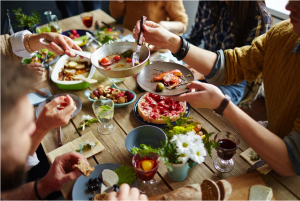
If you have symptoms of depression or anxiety, consider making some dietary changes. According to Rachael Schultz (2020) from Healthline, there are foods that can ease depression and anxiety such the Mediterranean Diet that includes fruits, vegetables, whole grains, legumes, fatty fish such as tuna and salmon, healthy fats like olive oil and raw nuts, and sweets and wine in moderation. Another diet that has shown promising results is the DASH diet that embraces whole grain, protein from fish, chicken, and nuts, non-fat diary, and limiting sugar intake. There are women who reported that cutting out sugar or decreasing sugar intake have significantly decreased their depression symptoms. A change in diet may not eliminate all symptoms, but it can help with conjunction with therapy and/or taking medication.
Get Moving
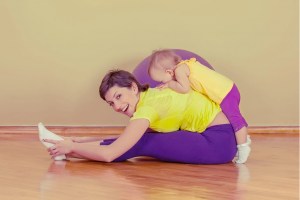
The pandemic has disrupted most people’s workout routine and day to day movement. The gyms were closed for a while and all workout classes canceled. Social distancing by staying home has been a good way to prevent us from catching COVID-19. Getting exercise or any kind of physical activity is an important part of our mental-health and wellbeing. According to the Mayo Clinic, exercise eases symptoms of depression, anxiety, and increases confidence by releasing feel good chemicals such as endorphins. Physical movement also prevents a number of health problems including heart issues, diabetes, and arthritic. Since we are at a new normal , establishing a new workout routine is part of a good self-care. If you were into taking classes such as Zumba or yoga, there are APPS that provide great workouts. I have been using Boho Beautiful APP for my yoga routine and mediation needs. Also, there are free workout videos on YOUTUBE and live stream classes such as Open Fit and Mirror Co if you miss the live experience. If you are not into exercising, establishing a routine where you engage in a physical activity might be a good way to get moving such as taking walks, running around the house with your kids, dancing to your favorite song in your bedroom, doing some yard work, or house work. Check with your doctor before starting a new exercise routine.
Socializing With Loved Ones

We as humans, are inherently social creatures. According to Dr. Emma Seppala (2017) a medical director of The Center for Compassion and Altruism Research and Education from Stanford Medicine, social connections improves physical, mental, and emotional wellbeing. Lack of social connection, on the other hand, may do just as much damage as smoking or having high blood pressure. During the pandemic, we have been social distancing from our friends and family, who are outside of our household, to prevent COVID-19 transmission and to decrease the amount of sickness and death associated with the virus. As a result, we have not been socializing as much as we were pre-COVID. Finding creative ways to continue to connect with friends and family during the Pandemic is important for our emotional wellbeing. Thankfully, we have technology that can assist us continuing to connect with our loved ones. My friends and family have found creative ways to connect with each other by having zoom parties, having coffee or a class of wine over Face Time, and checking in each other a couple of times a week. During good weather, meeting outside with masks on, while keeping 6 feet apart, is a good way to spend time together in person. Feeling connected and finding creative ways to is a healthy part of our self-care routine.
Getting Enough Sleep
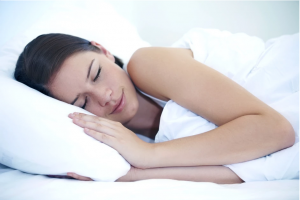
Joseph Crossman said once,” The bridge between despair and hope is a goodnight sleep” There is no question that lack of sleep effects our mental- health and emotional regulation. According to Eric Suni, from the Sleep Foundation, sufficient sleep, especially REM sleep, helps the brain process emotional information. An average adult should get from 7 to 9 hours of sleep a night. A common cause of sleep problems is poor sleep hygiene. The following are ways to improve sleep hygiene:
-
Having a set bedtime.
-
Finding ways to wind-down such as reading, meditating, and doing something relaxing.
-
Avoiding caffeinated beverages in the evening.
-
Diming the light and putting away electronic devices an hour before bed.
-
Getting regular exercise and sunlight during the day.
Work-Life Balance
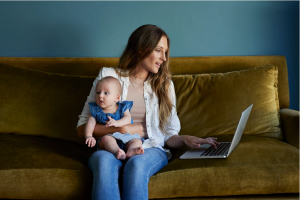
Since working from home became the norm during the pandemic, work-life balance has been a challenge to maintain. We don’t have the commute to break up our day or a coffee break in the break room. We also have to balance our work load, helping our children with remote learning, and other house hold duties. As a result, the work-home boundaries start to get blurred. Here are some ways of keeping a work life balance:
-
Keep regular work hours and stick with those hours.
-
Create and maintain a regular morning routine.
-
Set firm boundaries with people in your household during work hours.
-
Take breaks throughout the day.
-
Get out of the house, even if it is just to take a walk around your neighborhood.
-
Socialize with your coworkers so you don’t feel like an island.
Practice Mindfulness
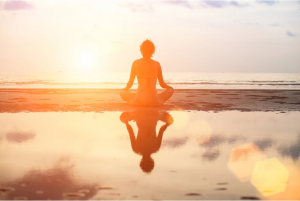
Mindfulness is a meditation method that has been around for centuries, is one of the practices of Buddhism. Within the recent years, mindfulness has been empirically proven to reduce stress, increase physical well-being, and improve happiness in our everyday life. Mindfulness is practice on focusing on the present moment, without judgement. For example, when going for a walk, noticing the trees and the flowers, the noises, and breathing in the air. When doing dishes, noticing how to soap feels on your skin. The goal of mindfulness is not to think about the future or the past, but focusing on our surroundings and what we are doing at the present moment, using all of our senses, allowing our thoughts to pass through without judgement or attachment, even if they evoke strong emotions. Mindfulness has definitely changed my life and helped me manage my stress since I have learned about it in graduate school. It’s a great stress management tool.
References
Mayo Clinic (2017). Depression and anxiety: Exercise eases symptoms. Retrieved March 5, 2021. https://www.mayoclinic.org/diseases-conditions/depression/in-depth/depression-and-exercise/art-20046495
Nirmita Panchal, Rabah Kamal, Cynthia Cox, and Rachel Garfield. (2021). Retrieved March 3, 2021. https://www.kff.org/coronavirus-covid-19/issue-brief/the-implications-of-covid-19-for-mental-health-and-substance-use/
Schultz, R (2021). These Women Treated Their Anxiety and Depression with Food. Here’s What They Ate. Retrieved on March 3, 2021 from https://www.healthline.com/health/best-diets-for-mental-health
Seppala. E (2014). Connectedness & Health: The Science of Social Connection. Retrieved on March 5, 2021 from http://ccare.stanford.edu/uncategorized/connectedness-health-the-science-of-social-connection-infographic/
Suni, E. Sleep Foundation (2020). Mental and Sleep: How sleep influences your mood and affects the development of depression, anxiety, and other conditions. Retrieved on March 5, 2021 from https://www.sleepfoundation.org/mental-health